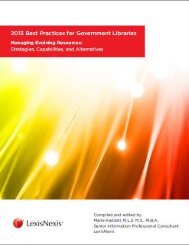2012 Best Practices for Government Libraries
2012 Best Practices for Government Libraries
2012 Best Practices for Government Libraries
You also want an ePaper? Increase the reach of your titles
YUMPU automatically turns print PDFs into web optimized ePapers that Google loves.
125<br />
BEST PRACTICES <strong>2012</strong><br />
eliminate the need <strong>for</strong> post-meeting review; according to Wainhouse’s research <strong>for</strong><br />
Citrix.<br />
(http://f8consulting.com/documents/Web%20Conferencing%20<strong>for</strong>%20Teams.pdf)<br />
Harvard Management Update lists five tips <strong>for</strong> better virtual meetings: 1) be very<br />
interactive, 2)use technology to enhance collaboration, 3) reserve meetings <strong>for</strong><br />
two-way communication, 4) level the playing field by requiring all participants to be<br />
either all alone or all together with others and to alternate time zone choice if<br />
different ones are involved; and 5) establish a no e-mail or instant messaging<br />
policy during the meetings. This is just business courtesy.<br />
(http://www.workshifting.com/downloads/downloads/5Tips<strong>for</strong>EffectiveVirtualMeetin<br />
gs_HBR.pdf)<br />
A note about communication collaboration across generations in the workplace.<br />
Baby Boomers, born between 1946 and 1964, value job status and social standing.<br />
Gen X, born between 1965 and 1979, change employment and careers frequently.<br />
Gen Y, born between 1980 and 1995, also known as the Net Generation, are<br />
technology smart confident, sociable, with strong morals and expect flexibility in<br />
the workplace with more frequent job changes. Gen Z born after 1995, also known<br />
as Digital Natives, use social media as primary communication, belonging to large<br />
communities online without necessarily knowing those within them personally.<br />
So, those are the challenges to collaborating through communication.<br />
5) A fifth type of collaboration in libraries is with other fields or specific areas of<br />
interest. For example, journalism is a field that is changing as dramatically as<br />
libraries are.<br />
A conference was held in April, 2011, in Cambridge called “Beyond Books: News,<br />
Literacy, Democracy and America’s <strong>Libraries</strong> – Assessing the Common Mission of<br />
Journalists and Librarians.” Beyond Books focused on librarians and journalists<br />
being committed to communities where people participate in self-governance. “Our<br />
libraries and our free press share a common mission of civic engagement and<br />
in<strong>for</strong>mation transparency.” This is based on the idea of Thomas<br />
Jefferson,”Democracy demands an educated and in<strong>for</strong>med electorate.”<br />
<strong>Libraries</strong> definitely play a role in an in<strong>for</strong>med electorate. In one article, “Tulsa City-<br />
County e-Library: The Library Can Become a Hub of Knowledge <strong>for</strong> the City and<br />
County of Tulsa”, I suggest that the public library can be the hub of knowledge<br />
management <strong>for</strong> a whole community. In a second article, “Branch <strong>Libraries</strong> as<br />
Social Network <strong>for</strong> Tulsa”, I suggest that branch libraries can provide a social<br />
network <strong>for</strong> a community by facilitating engagement of neighborhoods united at<br />
their branch libraries and connected on the web through social media. Coordinating<br />
this with the local newspaper created a coordinated collaboration <strong>for</strong> an in<strong>for</strong>med<br />
electorate. This collaboration can strengthen both fields of librarianship and<br />
journalism.<br />
In another field, Liz Bishoff in Library Journal said, “If librarians want to lead in<br />
creating the digital future, they need to learn how to work with their colleagues in<br />
museums and archives.”



